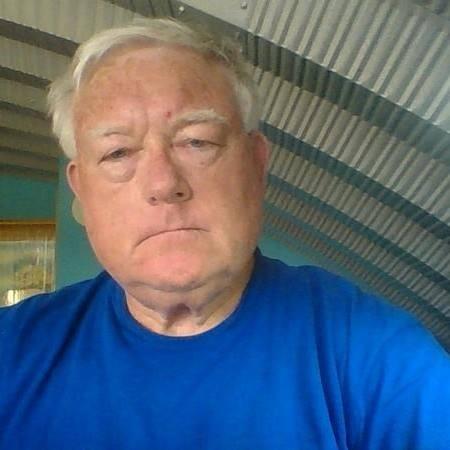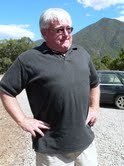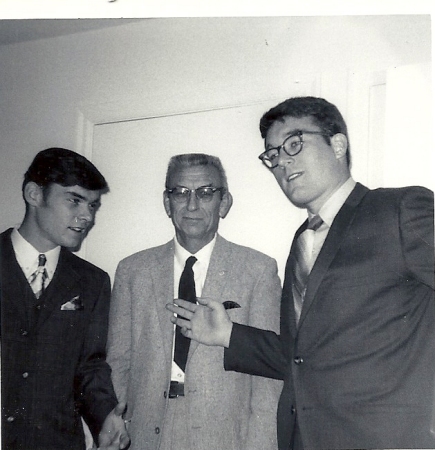Lewis Anderson:
CLASS OF 1965

Shawnee Mission North High SchoolClass of 1965
Shawnee mission, KS
Baker UniversityClass of 1969
Baldwin city, KS
Lewis's Story
(Continued from Profileâ¦) On that green field, I was filled with the promises of life. That I could do whatever I dreamed. See those lights, way up on the poles? We played varsity games at night. The bleachers steamed on these cool nights, packed with folks wearing coats and hats, yelling, pressed on by cheerleaders. Never saw anything like that in Kiwiland, did ya?â She mumbled something about Auckland and ârealâ football without pads and helmets. Boosted by the âmagicâ of Deregulation, this wife will see many US cities. Various airlines go out of business and we move to yet another Upstart. Seventeen times. How many wives would do that? New place; new job; as secretary, office manager, whatever, while I hired on as a co-pilot and if we stayed in business long enough, became a captain. We split when I asked her to move one more time. I was flying the Canadian backer for Tommy Hilfiger, mainly to Western Europe from New York or Montreal. I was never home much. I wanted her to move near our base in Bradley, Connecticut. She looked at a few houses. Never found anything to her liking and stayed in Columbus, Ohio to live whatever life she had gathered there without me.
My father died while I was on a European trip. My mother decided she would delay a Dedication for my father until I returned. She wanted me to give his eulogy. So, instead of London, or Paris, or Rome, I was in southern Alabama, in an un-air-conditioned Baptist Church, reviewing the life of the man who had been my father. I compared his life to mine. He had four children; I had none. How he worked three jobs to pay for their upbringing. That we never took vacations or had weekends shared other than working at his small junk business. How he worked at night, for 42 years, for the Telephone Company. I had returned from New Zealand to attend his retirement party, to remind him how he had told me he hated the company the last five years. How the job had changed: only numbers mattered. I teased him then, asking why he had stayed two extra years. Reminding him that I never worked five years for the same company. I spoke of my siblings. Declared that they and I were his best achievements. I told the strangers in the clammy pews, that I could not recall an incident of him spending money on himself. I went on to explain what this man had taught me, as I worked with him as a youngster, dismantling and sorting all the busyness of American machinery, so that it could be recycled. We discussed and explored why these items were junk. What went wrong? Often, this work amplified what I was learning in school. He advocated that I ask questions. To examine something to discern the âweak spotsâ so I could take it apart with the least effort and time. Soon, I was as tall as my father. Later, I learned to drive trucks so I could load burnt car bodies and haul them to town. We discussed why the world was as it is. We discussed Hitler. His small country. How could he become so powerful? We debated why two A-bombs were dropped on Japan instead of just one? We spoke of War and Freedom. I asked why we were always working. Cold in winter. Sweating and ash-covered in summer. His answers were concepts like property taxes, and mortgages, and various kinds of insurance, and health costs for my brother and sisters, and new shoes for me each school year. I had no finish for my story about my father. I mentioned that he was the most moral man I ever met. I retold an incident of how my brother and I complained to him, asking, âHow are we ever going to be rich?â He had just proposed to my brother and me that we remove the large stones and cement blocks we had hidden in the trunk of a car so it would weigh more when we went to town and would be paid more. In an attempt at a concluding overview, I said, âI believe we all chose our families.â Suddenly, it got soundless in this church--no coughing or shuffling of shoes on the floor, no rustling paper used to fan faces. âWe make bargains about this life before we come into it. Arranging whom we will meet. Determining whom we will love. Declaring the lessons we will learn.â I recalled that my father was a Mason, thinking that would impress this church crowd. I called on my brother, who was also a Mason, asking if he could tell us a bit about that. Then, I sat down next to my mother and held her hand.
I met Wife #3 online. Both of us were familiar with a keyboard and could form sentences. We spent six weeks getting to know each other before meeting. We both had enough marriage experience to know what we wanted next. While I was in Vietnam, she and Husband2, often referenced as the âSperm Donorâ for her two children, taught English in Micronesia for the Peace Corps. We have lively discussions about avoiding the Draft back then and me volunteering for the Draft. How stupid I was, she used to say. A few years ago, the TV show Survivor had an episode on Palau. We laugh about that. That was where she and her draft-dodging husband had R+R for a week. Forty-five years later, a TV show presented Palau as a test. No mention of Truk, the tiny island chain, where they lived in a thatched hut and were often chased by drunk men swinging machetes.
Having been a History major, this third wife was a busy companion while traveling. We bought a motorhome; embarked upon all the obligatory tours. First was the Alaskan Tour, where I learned to walk around carrying a fishing rod while eyesore from the scenery and solitude. The fish were safe. Then the War tours: Indian, Revolutionary, more Indian, and Civil. The Civil War was our most deliberate tour. I walked this Peace-Corps-History-Major up a ravine. âSee, we are sheltered from any fire. Following this gully up the hill, you notice that we cannot see much but grass growing on our immediate left and right and ahead of us. So, of course, the enemy cannot see us either. Imagine the muffled sounds, the cannons, the rifles of thousands of men firing, re-loading, growing stronger as we approach. The smoke. Horses whining. And just this narrow strip of sky above us.â We march to where we meet with Confederate forces. We know they are dug in along the side of and around this hill. The âRebsâ are re-supplied from the top of the hill with wagons coming down a trail to where this gully meets the Line. âSuddenly we come to where Union soldiers converge with Confederates at this one spot along the line. For 36 continuous hours, this spot becomes the focus of the battle. The Union reinforcing up through the gully,â I waved back at the way we had just come, âand Confederates reinforcing with wagons and men down from the top of the hill. All day long, then through the night and a rainstorm and into the next day and the mud and blood, with bodies stacked four deep. Hand-to-hand with bayonets and savagely swinging empty muskets, taking a stand, while stomping and struggling atop those bodies. A tree stump still stands sentinel at this spot. (Two days later, in the new wing of the American History Museum in DC, we see an eight-foot section of that tree trunk. Splintered, full of musket balls and shell fragments, as the pivotal exhibit of this entire War. No explanation about the clash of ideals.) In contrast, in a calm, treed, small town in Virginia, we learn, at a private museum in a brick schoolhouse donated by the county, âThatâs not what it was a boot.â The caretakers are a Virginian family and the son kept saying, âa bootâ when he meant to say âabout.â The curator and his family preserve a personal view of what we know as the Civil War. After nine hours, we both had become hoarse. We had arrived early (as advised to do) and had not stopped for lunch while taking in the grounds and the exhibits inside the schoolhouse. First, we toured the hills around their family farm where Union soldiers camped for the winter while officers took turns going home on leave. In the schoolhouse, one small cannon faced you as you came in the door. Tattered flags swayed from the ceiling. Black and white photos filled the walls. Glass-lidded cabinets of cooking utensils and buttons and belt buckles and mini-balls found in the dirt during years of farming aligned the floor. Off, on the right of the door, two tables with benches, thirty feet long, covered with opened, 3-ring notebooks and clear plastic page covers, held copies of letters from soldiers writing home. These pages are the heart of this museum. Many of these letters complain--something soldiers do best--about officers getting 10-day furloughs. â⦠but here I am camped in this muddy hole waiting for Spring.â (Acres of trees had already become firewood. More trees will follow. Snow and rain then create what every army knows best.) When writing home, this army comes to grips with what the fighting is âa boot.â In voices of common shades of pain and sacrifice, these letters are a timeless treasure telling a terrible mortal tale. At National Parks, I had tossed my well-used question at all the guides, like rolling a grenade on a floor. âEvery battlefield presents something I fail to understand about these contests. Over and over, at every hallowed ground, it is the same. Iâd like to hear your opinion on the tactics of these battles. But first, here is mineâand it comes to one pointless point. What compelled these soldiers to repeatedly charge into cannons? Like this cannon you have pointed at the entrance. Charging into the same cannon. Repeatedly. Iâve been shot at. Iâve been in the military where you are trained to be numb and dumb. But, I never charged the same spot twice like these guys. I think I would have refused to do it. I am not that brave. Why would they do it? Most uniformed NP employees never answered. Obviously, theyâd been trained to dance.â The best an...Expand for more
swer I got, I told my âa bootâ friend, was from a young, just out of college, fellow. He explained that most of these âsoldiersâ were farm boys from small towns. They had all enlisted with their friends, or had been Drafted with their friends. Simply, they did not want to appear lacking or un-brave in front of their friends. âAh, peer pressure,â I softly whispered to my âa bootâ friend. And told him I had said thanks to the young NP for this solemn, daring answer.
I watched the mother, who had been overhearing me, pull a drawer open from her reception desk near the entrance door, and approached us, holding out a folded bit of paper to interrupt her âa bootâ son as we argued, examined, and shared this uncivil war. She walked up to us and handed me the light-grey, folded paper from her hand. The paper she offered me was an insurance policy on a slave. It recorded the dates, the places, and to whom this slave had been rented, to do work on other plantations and farms. It gave a name and a physical description of the property/slave. Reading the inked, hand-written particulars into the blank spaces on the printed, old bit of business paper, surprisingly fresh-looking and in good shape, is when this brutally fought war became more than History for me. As I had learned in Vietnam, it is a tremendous job to change hearts and minds.
Recently, I have been forced to look back, with the help of VA counselors, using the lens of PTSD, at 1965 and what followed. Results of this effort were a surprise. Discovering what is Normal. Three wives. Longest held job was 4 and a half years. No trustâ¦. No respect for authority. Scan the roofline of the grocery store when walking across the parking lot. Sleep two hours at a time, as if I am still on guard duty. See lotsa sunrises.
I had gone to the VA to have a 6-monthly blood test done by them instead of the $210 whack at my small-town, local clinic. The VA looked at my cholesterol and triglycerides, offered pills without any trouble, but also told me I was depressed and had PTSD. âReally,â I said. âAll that was over forty years ago.â After two months of study about this PTSD prognosis, I submitted to their outlook. Then declared, âWhy should I spend another day with this?â I spoke with VA psychiatrists, psychologists, and social workers. Read recommended books, which lead to other books. I attended classes at the Vet Center in Santa Fe for Anger Management. (Took that one three times, along with Depression, and PTSD classes.) In Angel Fire, I took a week-long retreat with #3 for PTSD. This wife learned to never again tell me, âTo get over it.â Took a 3-month course on Cognitive Processing Therapy where a Vet advisor and I focused on just one of my listed stressors. I chose the most confusing one. That was a tough 12 weeks, tougher than Boot Camp. I almost quit, twice, as we examined my beliefs that lead to this stressor and the effect of those beliefs on my behavior.
This advisor wanted me to admit that it was three NVA I had killed one night while on guard duty and not three children as I remembered it. We deeply appraised the circumstances and the details leading to that night. Of four Americans, two on both sides of me, having their throats cut, while on guard duty three weeks prior. But not me and my hole-buddy, for I was awake, I wanted to get home. We examined my beliefs, the choices Iâd made to be there that night. The beliefs that drove my actions of that night. Taking in the shifting long-shadows formed by swinging flares, the colorless glaring cleared Kill Zone out front, between us and the tree line, the wagging orange-tracer lines of every twentieth-bullet out of the machine guns from the guard towers at the nearby airport. It was not three NVA crawling on their knees, but children who should not have been there. Should not have been attracted by the flares. I am right-handed and right-eyed, but in my nightmares of this incident, I am shooting using my left eye and shoulder. Neither I, nor the advisor, could answer why I use my left eye to sight down that M14. Halfway into this course, I learned about the concept of âmanufactured memoriesâ which are influenced by the need to make sense of our actions, our behavior. We argued over the fact that there were no bodies in the sand outside the wire in the morning. No children nor NVA. The advisorâs position was that no bodies meant that it had to have been NVA that I shoot that night and their buddies slipped the bodies away during the quiet of the long-coming sunrise.
I did additional study, which gave me relief. At the conclusion of WW2, the US Army did an investigation and learned that 50% of US soldiers, who had the enemy in their sights, did not pull the trigger. So, I was taught to fire my weapon âinstinctively,â or using, their professional term, âreflective shooting.â This means you acquire the target and squeeze the trigger without taking time to actual identify what it is that you are shooting. In a jungle, with short horizons and reaction times, this was a good thing. Usually. Afterall, I did get home.
This examination of beliefs is a never-ending exercise. More than two years after the CPT course, I still look at the worksheets created during the classes and the weekly âhomework.â I fill in new worksheets to accommodate the changes in my beliefs. Example: I did not get a vasectomy at the age of 24 because I did not want children, or that I wanted to be responsible for birth control, but because I had made a Cosmic Deal. I would not have children; I did not deserve to have children, because I had murdered three children one dark, cold night, shooting three targets before I recognized them as children.
One good thing the army gave me was my brother. He will be attending the â65 SMN reunion with me. He was three years behind me in school. So, he had chosen to follow âa different pathâ as the current conception explicates for our convenience. In school, I participated in team sports, enjoyed learning, and generally make good grades, while my brother was more of a loner, a questioner, a tester, a rebel. I had just started college, and during the first week of my brotherâs first year of high school, in an upper hallway, a senior tried to tell my âlittleâ brother how things were going to be. My brother broke this guyâs jaw with one punch. The Principal recommended that my brother come back next year and try high school again. Instead, my brother got a job moving furniture and driving trucks and never went back to high school. Two years later he, and the fellows he worked with, were caught emptying a place, late one night. A judge, as was common back then, offered my brother the choice of army or jail. Our mother set it up that my soon-to-be 17-year old brother would join the army if he could take Basic with his older brother. I had already quit college and was wearing a green uniform, taking tests to see where I would fit best in this army, and got delayed waiting for my brother to join me. I mopped floors for two weeks, until it is the Andersons against the Army. We line up next to each other each morning and bunked beside each other at night. As designed by our mother, we reviewed our childhoods and enjoyed sharing who we have become and helped each survive. I covered my brotherâs back as he fights everyone and he helps answer my repeated question: How did this army ever win a war? He and I have gotten closer through the years. After our parents died, we began having rotating family reunions each year. This year it is my turn to hold the gathering. So, when I asked my brother about parking at his place near Gardner during the upcoming â65 reunion, he says that it sounded kinda neat to go to a re-union and asked if he could tag along ⦠that he would never have the opportunity ⦠being a non-graduate and all. So, he will be my +1 for this 50th. He says he does not remember anything about a fight in the upper hallway and that I made it all up. He is a PTSD-disabled vet also. He also says that our upbringing was child abuse, having to work all the time junking cars for our father.
Our father graduated from Shawnee Mission Rural HS. I have come to value the lessons learned at that school, how they prepared me for life. How fortunate I was to have been there at that time. The district had grown to include a West, and East, and South. There was Special Education for a retarded sister of mine, and accelerated classes for me. (The growth of Johnson County would continue to create a Northeast and Northwest, to be the school my youngest sister would attend.) Taxes provided all this. The football stadium at North was larger than the stadium at Baker University where I continued to play football for a few more years and pretended to pursue a degree in Economics until, as a Junior, I decided to volunteer for the Draft and solve that little problem in SE Asia.
Now I live on the side of a mountain in northern New Mexico. The road to my house is so rocky that UPS refuses to deliver. During my wifeâs first heart attack, the ambulance wandered on the lower road for an hour, lost, because there are no street signs. Isolation attracts many vets to NM. The neighbor to the south is a 100% PTSD-disabled former Vietnam nurse. (Many combat veterans have come to call themselves âthe other 1%.â)
For perspective, I will attempt to remember (with Googleâs help) a few of the things that were news 50 years ago and have defined our time since. The Selma Walk took place 50 years ago. Marines entered South Vietnam, to protect the airbase at DaNang. Mini-skirts on women; long hair on men. Beatles released four new albums including Help. Northeast blackout. Riots in Watts for six days.
Perhaps I can "manufacture" enough memory to have a good time. CU then/there.
Register for Free to view all details!
Yearbooks
Register for Free to view all yearbooks!
Reunions
Photos







